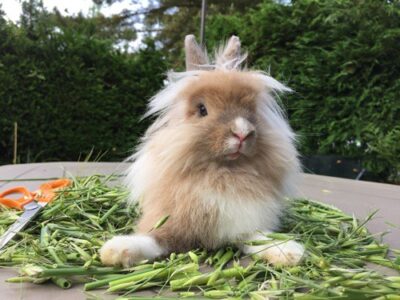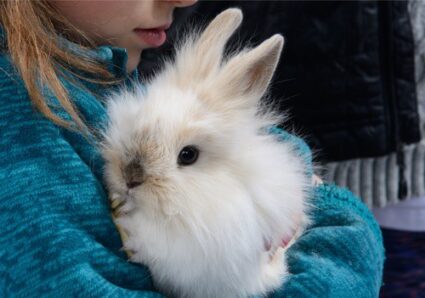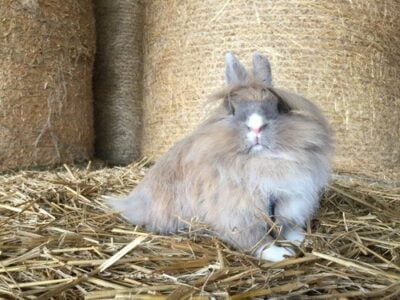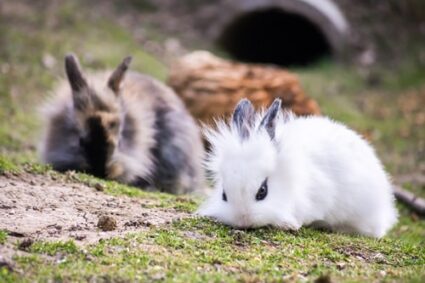Lionhead rabbits are adorable. Thanks to their furry manes, they look quite different from most other domestic rabbits. But, with all that fur comes some responsibility.
Establish whether you have a ‘single-maned’ or ‘double-maned’ rabbit. Single-maned rabbits should be groomed regularly, whereas double-maned rabbits must be groomed daily. Keep your rabbit cool to prevent heatstroke. Feed your rabbit lots of grass hay. Sugary foods should be off the menu because Lionhead rabbits are prone to dental disease.
However, it is the Lionhead’s personality which can be trickiest to manage. These rabbits are smart on the one hand, but timid on the other. This means they need plenty of entertainment, but minimal stress. With that in mind, we’ll show you how to keep your rabbit happy and contented.
Caring for a Lionhead Rabbit
Regardless of breed, rabbits share similar basic needs. Having said that, if you are taking care of a Lionhead, you should be aware of the following:
- Grooming – Your rabbit’s mane will need grooming at least every 1-2 days.
- Scared Easily – Although good-natured, Lionheads can become frightened very easily. So, they should be handled carefully, and stress should be kept to a minimum. These rabbits aren’t suitable for families with very young children.
- Smart – Lionhead rabbits are smart, so they need plenty of stimulation and enrichment.
- Temperature –These rabbits can become overheated if temperatures exceed 70 degrees Fahrenheit (21 degrees Celsius).
- Disease Prevention – Some breeders have started to favor Brachycephalic features (flat faces). Unfortunately, Lionheads with flat faces are prone to dental problems, respiratory tract diseases, and digestive disorders. However, not all Lionhead rabbits are flat-faced.
As long as you’re aware of the above, caring for this breed is quite straightforward.
What Is a Lionhead Rabbit?
These rabbits definitely stand out from the crowd. They have the mane of a powerful lion but the stature of a tiny rabbit. Perhaps that’s why they’re so endearing.
Where do these unique-looking rabbits come from? Well, they originated from Belgium. They were created when rabbit breeders were trying to produce a long-haired dwarf rabbit.
It is thought that the lionhead rabbit was created by mixing a Netherland dwarf and miniature Swiss Fox rabbit, though some people dispute this.
Lionheads are recognized by both the British Rabbit Council and American Rabbit Breeders Association. Although they are popular show animals, they are also considered great pets.
Characteristics of a Lionhead Rabbit
Lionhead rabbits share the following characteristics:
- A wooly, medium-length coat (although it appears wooly, it is soft to the touch).
- A mane that runs around the rabbit’s head. The mane is usually at least 2 inches long.
- Some Lionheads have woolly fur on their cheeks, chest, and/or hind-quarters.
- Lionhead rabbits can come in lots of different colors. For example, the British Rabbit Council acknowledges at least 18 different colors including Chocolate, Iron Gray, Lilac, and Cinnamon.
- Some Lionheads have flatter-faces than other rabbits. The Brachycephalic (flat-faced) features could be mild or very pronounced.
- A friendly personality, but they can become spooked very easily.
- An average lifespan of 7-9 years.
How Big Do Lionhead Rabbits Get?
Compared to other rabbits, Lionheads are quite small. On average, they weigh about 3 lbs. (1.7kg). In terms of length, the average Lionhead is 8-10 inches long. They have reasonably long ears for their size (2-3 inches), and their mane is 2-3 inches long.

Single or Double Mane
Lionheads can be born with either a ‘single’ or ‘double’ mane.
As you might expect, double-main rabbits have twice as much fur. In fact, they have an excess of fur around their hindquarters, as well as around their necks.
In contrast, single-mane rabbits only have excess fur around their necks (not their hindquarters). Also, as they age, the mane may begin to look a bit sparse.
People who struggle to find the time to groom their rabbit might prefer a single-maned Lionhead bunny. But, if you find the grooming process therapeutic, you may prefer a double-maned rabbit.
Any reputable breeder will be able to tell a ‘single’ from a ‘double’ at birth, so don’t be afraid to ask.
How Much Do Lionhead Rabbits Cost?
Rabbits can cost between $20 and $150, depending on how ‘show worthy’ they are. Blue-eyed rabbits tend to cost a bit more, as do double-maned rabbits.
Although the initial outlay costs are quite low, rabbits can be expensive pets. You’ll need to factor in startup costs such as the cost of the hutch, as well as ongoing living costs like food, toys, grooming, and vet care.
Hutch Requirements for Lionhead Rabbits
Before choosing a rabbit hutch, you will need to consider a few things. Rabbits need quite a lot of space, so make sure you have the space to accommodate a sizeable enclosure. Also, can you monitor the temperature to make sure your rabbit is comfortable?
When designing a rabbit hutch, pet owners take different approaches. There is no one-size-fits-all rabbit enclosure, but there are some bare minimum requirements you will need to provide Lionhead rabbits. The information you’ll need is provided below.
How Big Should the Hutch Be?
These animals are small, yet active, so it’s important to provide them with enough space. Also, rabbits (regardless of breed) should not be kept alone. So, your hutch should be big enough to accommodate 2 rabbits.
Rabbit Welfare says that 2 rabbits should be provided with an enclosure that is at least 6 x 2 x 2 foot (1.8m x 0.6m x 0.6m).
The average hutch in a pet shop tends to be 1.25m x 0.45m. As Lionhead rabbits are small, this hutch size may be just about big enough for 2 rabbits. However, if you can provide the extra space, then do. Your rabbits will thank you for it.
In addition to the hutch, your rabbits should have regular access to a playpen or ‘run.’
What Temperature Does a Lionhead Rabbit Need?
Generally speaking, rabbits prefer cool-to-moderate temperatures.
They can tolerate temperatures between 32 degrees and 70 degrees Fahrenheit (0-21 degrees Celsius), as long as there is shelter from wind, rain, and excessive humidity.
Lionhead rabbits have plenty of fur so they can probably tolerate slightly cooler temperatures than shorter-haired rabbits.
Indoors vs. outdoors
A question many owners have is, ‘should my Lionhead rabbit live indoors or outdoors?’ Well, these rabbits can thrive in both settings. Factors such as local weather and how hot/cold your home is are important to consider.
Indoors
The temperature of the average home is between 55-degrees and 70-degrees Fahrenheit (13-21 degrees Celsius). This is a comfortable temperature for most rabbits. But if the temperature climbs above 70 degrees Fahrenheit, Lionhead rabbits will struggle.
If your rabbit lives indoors, it’s important to monitor the ambient temperature regularly throughout the day. Also, if your home is very warm and well-insulated, put the rabbit hutch in the coolest part of the house.

Outdoors
Rabbits can tolerate cold ambient temperatures, but they must be sheltered from the wind and rain. So, if you choose to put your rabbits outdoors, make sure their enclosure is fully weatherproof. In other words, make sure that:
- The cage is positioned out of prevailing winds
- There is enough shelter from the sun and rain
- The enclosure is raised off the floor to ensure the floor stays dry
In the winter months, be prepared to add some extra hay or blankets to your rabbit’s cage for warmth. Also, it’s important to check on your rabbits regularly to make sure they are comfortable.
Once you decided whether to keep your rabbits indoors or outdoors, try not to chop and change. Rabbits can develop shock if they are moved from one environment to the other too quickly. In some cases, this may be unavoidable, but it’s best to avoid the upheaval whenever possible.
Can Lionhead Rabbits Live Alone?
No, it would be cruel to keep a single rabbit as a pet because rabbits are sociable animals. If forced to live alone, they may become stressed and anxious. Lionheads can become frightened quite easily, so they will benefit from having a mate.
It is OK to pair two different breeds of rabbit, as long as they are not drastically different in size. A good ‘fit’ for a Lionhead might be a Netherland Dwarf, Himalayan, or Mini Lop.
Can these Rabbits be Litter Trained?
Many rabbits can be litter trained, especially if you have the patience to stick to a training regime. Lionheads seem to be a particularly intelligent breed, so they usually respond well to litter training.
In fact, some pet owners have even trained their Lionheads to respond to simple commands in the same way as a dog would. The most popular method for achieving this is Clicker training.
If you want litter training to run as smoothly as possible, consider neutering your rabbit when he/she is old enough.
What Lionhead Rabbits Like to Play With
As mentioned, Lionhead rabbits are smart, so they need an enriching and interesting environment. They will take pleasure in the toys that most other rabbits enjoy such as:
- Tunnels – You can buy rabbit tunnels from pet stores or repurpose old pipes.
- Toilet Roll Tube – Rabbits enjoy playing with toilet roll tubing, especially if it has been stuffed with hay or fresh herbs. However, make sure your rabbit doesn’t eat the cardboard.
- Untreated Wood – This can be used to make ramps in your rabbit’s enclosure. Rabbits love to explore their surroundings so you can try moving the ramp around occasionally.
- Hard Plastic Baby Toys – Baby toys are ideal for rabbits because they will have passed the ‘choke test.’ So, even if your rabbit gnaws away at the toy, there will be no chance of choking.
- Exploring the Garden – Most rabbits love nothing more than exploring their yard.
- Playing with their Mate – Rabbits thrive in the company of others, so the kindest thing you can do for your rabbit is give them a bonding partner.
Points to Remember
Rabbits are attracted to wires, so, if you allow your rabbit to roam indoors, make sure charging cables are out of reach. If you confine your rabbit to one or two rooms in the house, it will be easier to ‘rabbit proof’ these rooms.
Also, when your rabbit goes outdoors, it’s best to place them in a pen or a run. Some plants are poisonous to rabbits, so you’ll need to keep your rabbit away from these.
Long-haired rabbits can become messy after going outdoors, so it’s best to groom your rabbit after each outing.
Do Lionhead Rabbits Bite?
Pet rabbits will bite if they feel threatened. Since Lionheads are very sensitive (and small), they are more likely to feel threatened than some other breeds. This means they are more likely to bite if handled inappropriately. However, you can prevent bites by:
- Only picking your rabbit up when necessary
- Handling your rabbit confidently, but with the minimum level of restraint required
- Not making any loud or unexpected noises around your rabbit
For the reasons mentioned above, households with noisy pets or very young children are probably not suitable for Lionhead rabbits.
How to Avoid Stress in Rabbits
As we know, these rabbits can become stressed quite easily, but what actually causes stress in rabbits? Well, as mentioned, living alone is probably the biggest cause of stress in rabbits. As such, most animal welfare agencies believe it is cruel to keep one lone rabbit.
Besides loneliness, the following things can make a Lionhead rabbit stressed:
- Cage Can Be Seen by Predators – Think about the position of your rabbit’s cage. Can dogs or other predators poke their noses in? If so, this could be stressing your rabbit out. Don’t assume that just because there is a barrier between your rabbit and predators that they will feel ‘safe.’ Also, any new visitor to your house/yard will be seen as a predator, so keep this in mind when introducing your rabbit to others.
- Inappropriate Handling – If you handle your rabbit too often, or you are too heavy-handed, this will cause stress.
- Strange Smells or Sounds – Rabbits have a heightened sense of smell and hearing. In fact, they may hear/smell things that don’t even register with you. Try to put your rabbit in the quietest part of the house or garden. Also, do not expose your rabbit to smoke, fumes from incense burners, or the vapors from essential oil diffusers.
- Boredom – Rabbits can become stressed if they are confined to one place for too long. Make sure your rabbit has regular access to a run or playpen. Ideally, move the run around to different parts of the garden so your rabbit gets a change of scenery.
- Visits to the Vet – These can be extremely traumatic for a rabbit, but there are some ways you can ‘prepare’ your rabbit for a visit to the vet. According to Veterinary Practice, it’s a good idea to introduce the carrier to your rabbit before taking them to the vet. Leave the carrier inside their hutch so they can play in it. Also, when in the carrier, you can drape a towel over the top to help them feel safe. But you must regularly check that your bunny is getting enough air. After the visit, it may take several days or weeks for your rabbit to ‘settle down.’ Try to be as gentle as possible during this recovery period.
- Poor Ventilation – Make sure your rabbit has enough fresh air circulating around their enclosure at all times. Poor ventilation can cause them to become lethargic. Eventually, they will struggle to breathe. A clear sign of this is head tilt (Torticollis).
Grooming Requirements
Anyone interested in getting a Lionhead rabbit should be aware of how much grooming is required.
Your rabbit’s mane will need to be brushed at least once every 2 days. And if you have a double-maned rabbit, you’ll probably need to brush your rabbit daily. You should focus on the mane around the head, and any extra fur around the hindquarters.
If your Lionhead rabbit has long hair around his/her rear end, this may need to be trimmed. You’ll know the hair needs trimming if it starts to get soiled with rabbit poop or pee.
Grooming is necessary for several reasons. If you don’t take care of your rabbit’s mane, it will become matted and tangled. Tangles can become very painful and will need to be cut out. Also, if too much fur builds up, your rabbit will be forced to remove this fur, and this could lead to hairballs. Hairballs are associated with a serious digestive disease called gastrointestinal stasis.
So, to prevent disease and discomfort, take the time to groom your rabbit at least once every 2 days.

How to Brush a Lionhead Rabbit
There are various tools you can use to brush your rabbit’s mane and coat. Before we explore the various tools, keep the following in mind:
Above all, you must be gentle. Rabbits – and especially small rabbits like Lionheads – are small and delicate so they must be handled gently.
Lionheads can become stressed quite easily, so you will need to approach your rabbit carefully. Start by petting your rabbit and allow him/her to get comfortable before you start the grooming process.
Sometimes, a Lionhead’s mane will fall into a fringe between the ears. This creates a kind of wool cap. If your rabbit has this, you must be especially careful when grooming.
Tools for Grooming
It is advisable to invest in the following tools:
- A Slicker Brush – This is a great tool for distributing oils and keeping your rabbit’s hair smooth. Choose a slicker brush designed for rabbits or small animals as the larger brushes may apply too much pressure.
- Rubber Brushes – These are good for dislodging hair which has already begun to shed, but which has not fallen away yet.
- Small Scissors and Comb – If you keep on top of your rabbit’s grooming, you shouldn’t get too many tangles or mats. However, it’s good to be prepared and have a small pair of scissors and comb to cut out tangles if these arise. This must be done extremely carefully to avoid injuries. Always cut as far up the fur as possible and check where you are cutting to make sure there is no chance of piercing the skin.
Why Do Lionhead Rabbits Shed?
All rabbits shed their fur, but because Lionheads have quite long fur, they have more fur to lose.
At the beginning of winter, Lionhead rabbits develop a very thick winter coat, and in the spring, a lot of this fur is shed. When you witness this for the first time, you might wonder if your rabbit is losing its mane. But, don’t worry, that’s not the case. It will grow back.
As singled-maned rabbits get older, the wooly mane can become a little sparse, but it will not disappear altogether.
Can you Bath a Lionhead Rabbit?
Due to their long fur, Lionheads can get messy. As such, it might be tempting to bath them. However, you should avoid doing this unless necessary. In most cases, brushing will remove dirt and dust from your rabbit’s fur, and your rabbit can deal with any mess that’s remaining.
However, if your rabbit has urine-soaked fur (urine scalding), this should be washed. It’s best to ask your vet to do this, or at least show you how it’s done.
What Can Lionhead Rabbits Eat?
Lionhead rabbits have the same dietary requirements as other small-sized rabbits. In essence, this means they should be given unlimited grass hay and water, a moderate serving of green veggies, and a small number of high-fiber pellets.
As we explore below, Lionhead rabbits are particularly prone to dental problems. As such, it’s best not to give any sugary foods to this breed of rabbit (including fruit). To be on the safe side, you can ‘treat’ your rabbit with other foods such as Brussel sprouts and herbs.
Health Issues Explained
According to Vet Times, there is a growing trend for flat-faced rabbits, and Lionheads are of the breeds to be affected. Unfortunately, flat-faced rabbits can have the following health problems:
- Dental Issues – The flatter the rabbit’s face, the less space there is in the mouth for the teeth to grow. This means teeth are likely to become crowded and abscesses may develop.
- Respiratory Problems – According to Pet Plan, Lionheads (especially the very flat-faced varieties) are more likely to suffer from breathing issues. This is because the teeth are positioned so closely to the bottom of the nose; as the teeth grow, this can cause the sinuses to become inflamed, which can lead to breathing problems
- Tear Duct Problems – If the rabbit’s face is very flat, tears may not drain away normally. This can lead to eye infections.
- Gastrointestinal Problems – All rabbits have sensitive digestive systems and can be prone to gastrointestinal problems. However, Lionheads are particularly prone to this due to the higher rates of dental disease.
Although there is a trend for flat-faced Lionheads, there are many Lionhead rabbits with more natural-looking features. Opting for a rabbit with natural features is going to be cheaper as your rabbit is less likely to suffer from the above health problems.
When choosing a Lionhead rabbit, it’s a good idea to ask to see the rabbit’s parents. This will give you a good idea of how your rabbit will look as he/she grows older.
Lionhead Rabbit Care Checklist
Lionhead rabbits are special and unique animals. They can make fantastic pets, as long as they are cared for appropriately. We’ve discussed the key things you need to know when looking after a Lionhead rabbit. Let’s finish by summarizing the key points:
- Make sure you have space for 2 rabbits.
- Groom your rabbit’s mane every 1-2 days.
- You may need to trim the hair around your rabbit’s hindquarters (especially if you have a double-maned rabbit). If you are not sure, you can speak to your vet for advice.
- Do not force your rabbit to endure temperatures above 70 degrees Fahrenheit. Lionhead rabbits can live outdoors in most climates, but they must have shelter from wind, rain, and sun.
- Do not give your rabbit any sugary treats (including fruit). This is to avoid dental issues.
- Don’t let your rabbit get bored. Provide plenty of toys and provide a safe space for your rabbit to hop around regularly.
- If your rabbit has quite a flat face/nose, monitor his/her breathing on a daily basis. If you notice any signs of respiratory illness, lethargy, or gastrointestinal problems, contact your vet.
Above all, make sure your rabbit feels secure. Lionheads are cautious animals, so they need somewhere they can feel safe. If that can be provided, then you’ll build and deep and satisfying bond with your Lionhead rabbit.


I donnot think pet insurance companies are a reliable source of information regarding whether a “squished faced” rabbit is more or less healthy than other breeds with longer nozzles, this should be checked with a rabbit savvy veterinarian instead
I have a lionhead mini lop who is the perfect example of health in spite of his “squished face” but the rabbit I had prior to him, a Teddy Dwerg with longer nozzle which I rescued, had dental issues all of her life so please check your sources if you are going to provide info to prospecting owners
“No, it would be cruel to keep a single rabbit as a pet because rabbits are sociable animals. If forced to live alone, they may become stressed and anxious. Lionheads can become frightened quite easily, so they will benefit from having a mate.”
This is patently false. Any rabbit is capable of living a long and happy life being kept solo as long as the owner has the time and capacity to give it the consistent care and attention it needs. Rabbits can benefit from being paired, especially if the owner expects to often be busy or unable to socialize with the rabbit, but this is not a requirement for rabbit ownership.
-Owner of a playful, loving single maned lionhead who lived to be 14 years old